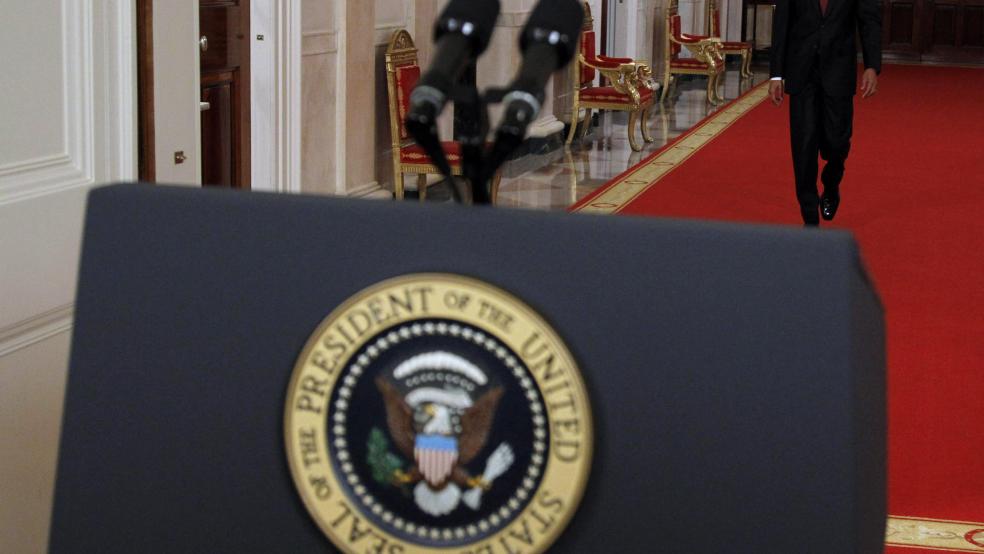For someone who soared to political fame on his rhetorical gifts, President Obama has not been helped much by the bully pulpit.
Obama takes to the podium (again) tonight to press his case for Congress backing his plan to bomb Syria. He also sat down Monday for six TV interviews. The purpose of all this talking is to convince undecided lawmakers and a dubious public that Syrian President Bashar al-Assad should face repercussions for killing 1,400 of his citizens with chemical weapons.
“He’ll make the case that you don’t want to live in a world where children are gassed to death by a dictator and face no consequences,” Ben Rhodes, Obama’s deputy national security adviser, told MSNBC. “At the end of the day, I think the American people understand—as difficult as it is—that we have an interest in acting.”
The president might also be a pragmatist, suggesting that only a sign of strength would enable a possible deal brokered with Russia to avert a strike. “If we don’t maintain and move forward with a credible threat of military pressure, I do not think we will actually get the kind of agreement I would like to see,” the president told CNN in an interview broadcast Monday night.
But Obama’s past speeches have been less than persuasive. The Fiscal Times examined three of his most prominent addresses: his 2009 remarks to Congress about health care, his 2011 speech about the economy, and his meditation last year after the Newtown shootings. As compelling as Obama can be from the stump, his presidential speeches have seldom had a lasting impact on public opinion.
Doug Wead, a presidential historian who worked in George H.W. Bush’s White House, said the power of the presidency to influence the public is as great as ever. But in an era of a fragmented media, Obama seems to lack the oratory skills of a Ronald Reagan or FDR. “With this president, you could not do what you could do with Reagan, where you could track the poll numbers and attribute success to a speech,” Wead said.
RELATED: OBAMA IS LOOKING MORE AND MORE LIKE JIMMY CARTER
But research by Texas A&M University political scientist George C. Edwards III – recently highlighted by The Washington Post’s Dan Balz – indicates the bully pulpit has been overrated.
“There is not a single systematic study that demonstrates presidents can reliably persuade others to support them,” Edwards wrote in a paper for the American Political Science Association. “The most effective presidents do not create opportunities by reshaping the political landscape. Instead, they exploit opportunities already present … to facilitate significant changes in public policy.”
TONIGHT’S TWO MAJOR HURDLES
Obama faces two hurdles on this issue. For starters, most polling indicates that Americans oppose strikes against Syria, with the majority saying it could draw the U.S. into a larger war. Obama’s approval rating on foreign policy is a dreadful 33 percent, according to a new survey by the Pew Research Center and USA Today. Secondly, more Americans are tuning him out. Just 33.5 million Americans watched his State of the Union address this year, the lowest ratings tracked by Nielsen since 2000. More than 52 million Americans viewed his first State of the Union.
Back on Sept. 9, 2009 – with his approval rating at 53 percent, according to Gallup – Obama spoke to a joint session of Congress about his proposal to provide near-universal health insurance. “Now is the season for action,” Obama said. “Now is when we must bring the best ideas of both parties together and show the American people that we can still do what we were sent here to do. Now is the time to deliver on health care.”
As the president said his plan would not provide insurance to illegal immigrants, Rep. Joe Wilson (R-SC) yelled out, “You lie!” That startling moment suddenly defined the speech, for better or worse. This was Obama’s most effective speech. Polling by CBS News afterward found that 52 percent of Americans approved of how he handled health care, compared to 40 percent the week before.
The Affordable Care Act, with its tax penalties for those without health coverage, became law in March, 2010. But with its new insurance exchanges set to begin enrollment on Oct. 1, Obamacare never proved as popular as that moment after the speech. Just 37 percent approve of the law, while 67 percent of uninsured Americans say they do not know how Obamacare impacts them, according to polling by the Kaiser Family Foundation.
RELATED: SYRIA CRISIS EXPOSES OBAMA’S FAILED MIDEAST POLICY
By the end of August 2011, Obama’s popularity had sunk to its lowest level – just 38 percent, according to Gallup. The country had narrowly averted a default on its debt, after a last-minute deal to raise the debt ceiling and cut long-term spending. So on Sept. 8 of that year, Obama again spoke to a joint session of Congress about his jobs plan. Republicans now controlled the House majority. And Obama began his speech with a nod to its possible irrelevancy, saying that follow-up polls did not matter to the unemployed.
“This past week, reporters have been asking, ‘What will this speech mean for the president? What will it mean for Congress? How will it affect their polls, and the next election?’” he said. “But the millions of Americans who are watching right now, they don’t care about politics. They have real-life concerns.”
But it takes popular support to move a $447 billion jobs plan through a Congress that cares more about the budget deficit.
Polling by Bloomberg News after the address found that 62 percent of Americans disapproved of how Obama had handled the economy. The majority of those surveyed believed his plan, which was dead on arrival, would not help lower the unemployment rate.
Obama notably chose to speak to the nation again after 20 children and 6 adults were shot at the Sandy Hook Elementary School in Newtown, Conn., on Dec. 14, 2012. At a prayer vigil days later, the president said, “This is our first task, caring for our children. It’s our first job. If we don’t get that right, we don’t get anything right. That’s how, as a society, we will be judged. And by that measure, can we truly say, as a nation, that we’re meeting our obligations?”
The administration pushed for tighter restrictions on the sale of firearms afterward. A February poll by Quinnipiac University showed more than 92 percent of the country supported background checks for people buying guns online or at shows, one of the reforms supported by the administration. A majority favored banning ammunition clips with more than 10 bullets. This time Obama clung to popular opinion when making his case on gun control. But in a sign of the bully pulpit’s shortcoming, the Democratic-majority Senate could not pass the reforms.
“Victory for not doing something that 90 percent of Americans, 80 percent of Republicans, the vast majority of your constituents wanted to get done?” a frustrated Obama said afterward. “It begs the question, who are we here to represent?”





